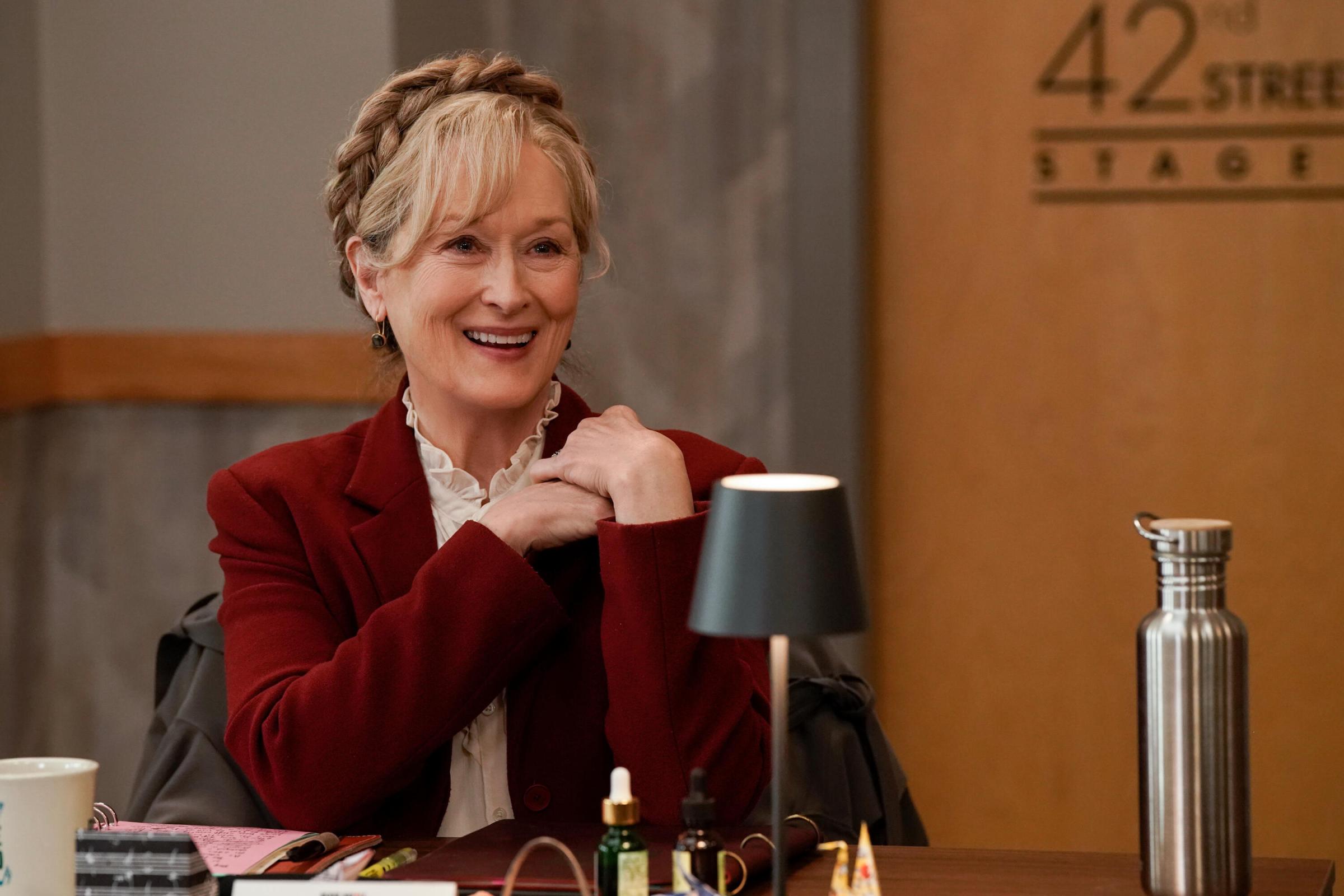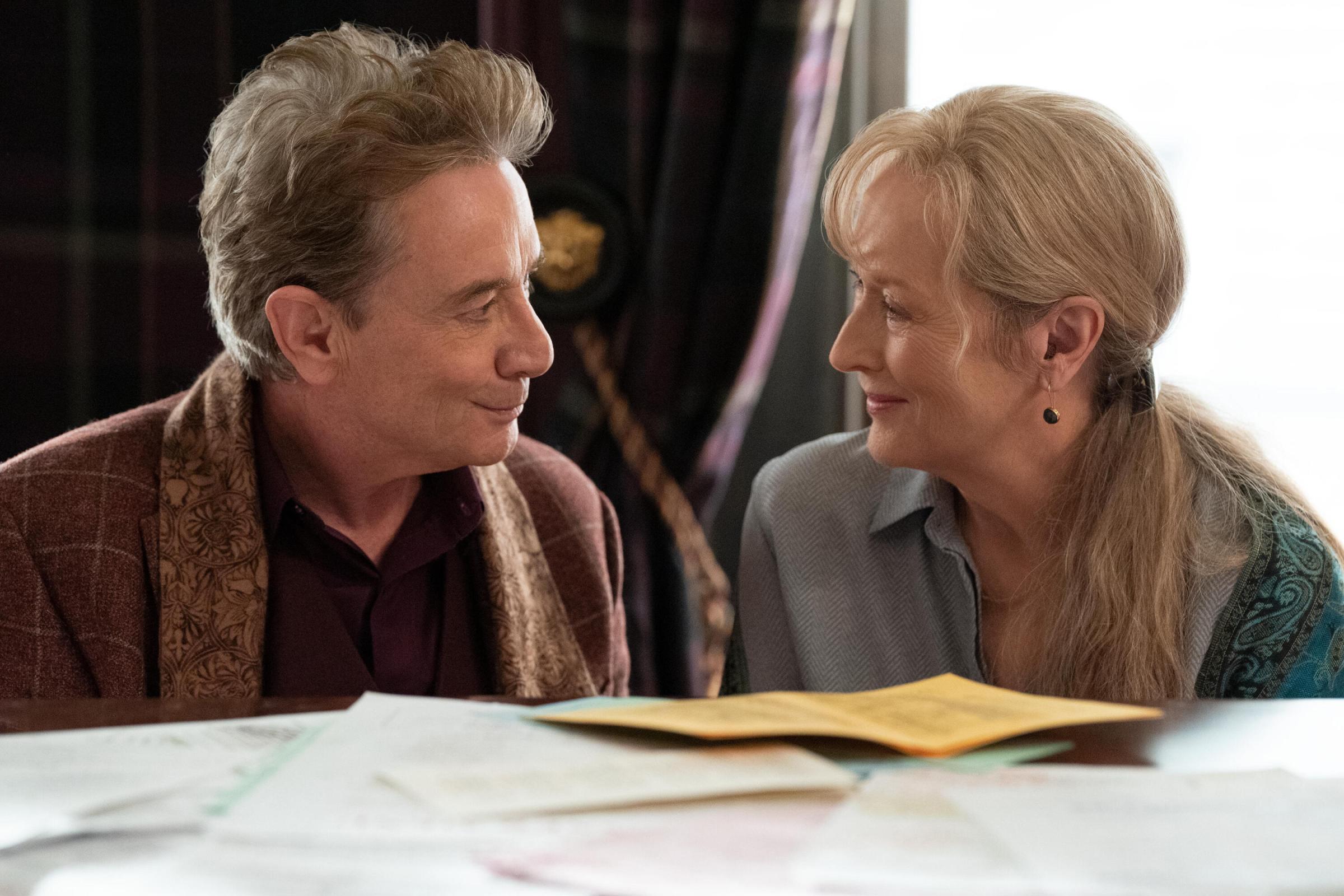Spoiler alert: This article discusses Only Murders in the Building Season 3, episode 3
The third season of Hulu’s hit mystery series Only Murders in the Building opens with the introduction of a new character. On-screen text situates us at Broadway’s (fictional) Goosebury Theater in 1962, where a little girl in blonde braids becomes so enchanted by a performance, she drifts out of her seat, right up to the stage. Steve Martin’s voiceover disrupts the reverie: “Once smitten, though—then comes the work.” We watch the child grow into a woman, taking dance classes, endlessly auditioning, finding only rejection. But we don’t get a clear view of her until she arrives, unannounced, on the Goosebury stage six decades later. It’s Meryl Streep.
Described by a casting agent as “capable, a little vanilla,” Streep’s Loretta Durkin is there to try out for Oliver’s (Martin Short) new play, Death Rattle—a rural mystery whose gimmick is that the only witness to the central murder is a baby. Her audition, for the featured role of the infant’s fiercely protective nanny, is incandescent. It’s not subtle; this is theater, after all. It’s capital-A Acting, executed with warmth and control and grandeur. Because of course it is. Why else would you bother hiring one of the most celebrated actors of our time to play a late-in-life Broadway discovery? Streep has made a handful of splashy forays into television over the past few years, but Only Murders is the first of these shows that really knows how to use her.

She’d graced the small screen before—most notably with an Emmy-winning performance in HBO’s tour-de-force adaptation of Angels in America—but Streep’s role in the second season of Big Little Lies, in 2019, felt like a sign of the times. As an addition to an A-list cast that included Nicole Kidman, Reese Witherspoon, Laura Dern, and Zoë Kravitz, she proved the existence of a very short A-plus list: the kind of movie star whose arrival on TV was, in itself, proof of the medium’s ascendance. And Streep was a lot of fun as the ghoulish mother-in-law who tries to seize custody of abuse survivor Celeste’s (Kidman) twin sons. Remember that scream?
But the relentlessly meme-ified scream kind of illustrated the problem. Even among such skillful, charismatic, household-name actors, Streep’s outsize presence overpowered everyone else who appeared and everything else that happened in the season. Most performers easily shrink to fit our living-room TV sets, but, for better or worse, Meryl fills a five-story IMAX screen every time. If you watched Apple’s speculative climate-change drama Extrapolations, earlier this year, perhaps you also found it hard to get past her arresting dual role as the late mother of a scientist played by Sienna Miller and the anthropomorphic voice of the world’s last humpback whale.

Martin and his Only Murders co-creator John Hoffman seem to get that Streep can be distracting in a supporting role. I think they also understand that, maybe more than any other living actor, she’s viewed by the pop-culture-savvy public as a veritable avatar for the art of acting. If someone burst into tears and you replied, “OK, Meryl,” they would know you thought they were putting on a show. That’s what makes her casting as a mere foot soldier in theater’s army of have-nots so resonant at the same time as it’s irreverent. It feels perversely fitting that the woman who embodies the thespian spirit should play a character so tenacious, she still lives and breathes showbiz—still shows up and gives it her all—after 61 years without a big break.
Of course, like all new characters on Only Murders, Loretta is also a mystery unto herself. Why is Oliver the first director to appreciate her obvious talent? (“Where have you been?” he demands at the audition.) How has she sustained herself for all these years? Why is she brilliant in her audition but atrocious at Death Rattle’s first table read, cycling through inappropriate accents and spacing on her cues? Can that weirdness really be explained away by nerves? Why is Ben—this season’s murder victim, a sophomoric Hollywood leading man played for laughs by a charmingly goofy Paul Rudd—so convinced that Loretta isn’t just a “stinkeroonie” as an actor, but a “fellow snake”? And could her motives for romancing Oliver possibly be pure?
This week’s third episode further complicates the character. If Ben hated Loretta so much, why has his brother Dickie (Jeremy Shamos) been so quick to sign on as her manager? Motivation aside, Dickie helps her get a role on “an offshoot of an offshoot of a Grey’s Anatomy spin-off.” The character “has a backstory, Oliver!” Loretta enthuses. “And lines. And the producers said they might give me a limp.” But she and Oliver have their first spat when the shoot conflicts with his show—now a musical titled Death Rattle Dazzle—and he enforces her pre-existing contract. After he relents, it’s anyone’s guess whether Loretta decides of her volition to stick with Oliver for romantic or professional reasons, or if she has an entirely different set of ulterior motives.

Streep is no minimalist. She knows just how much additional ham a show with a lot of big performances, from Short’s to that of Linda Emond and Wesley Taylor as the creepily affectionate mother-son producing team Donna and Cliff DeMeo, can take. And she knows her presence has meaning beyond the character she plays. Meryl confessing she’s “not good at table reads”? Clever! Meryl bonking herself on the head with a lantern during a dance number? Funny! Meryl moving her castmates to tears with a performance of the nanny’s lullaby? Divine!
Most of all, Streep is great at building layers of ambiguity into a self-consciously stylized performance. Loretta has a lot of personality, but what’s genuine and what’s theater remains mysterious—which is ideal for the purposes of Only Murders, a show that has to keep viewers guessing about who is a murderer and who is just another Upper West Side oddball. Ben’s accusation seems to rattle Loretta; her humble, just-happy-to-be-here facade cracks when she gripes to Mabel (Selena Gomez) that he’s “a f-cking asshole.” Is she just mad that he was mean to her, or is she angry that he survived at all? We see another flash of her nasty side when Oliver reminds her that she’s under contract and she mocks his quixotic musical pivot.
These are relatively brief, quiet moments, easy to forget amid so much slapstick and sleuthing. But when Loretta gently muses that “there’s a vulnerability. That’s what makes Oliver Putnam special”? I couldn’t be more worried for him. Does the vulnerability she’s identified put him at risk of becoming the killer’s next victim, or just a broken heart? Who can say? It’s Meryl!
More Must-Reads from TIME
- Donald Trump Is TIME's 2024 Person of the Year
- Why We Chose Trump as Person of the Year
- Is Intermittent Fasting Good or Bad for You?
- The 100 Must-Read Books of 2024
- The 20 Best Christmas TV Episodes
- Column: If Optimism Feels Ridiculous Now, Try Hope
- The Future of Climate Action Is Trade Policy
- Merle Bombardieri Is Helping People Make the Baby Decision
Contact us at letters@time.com